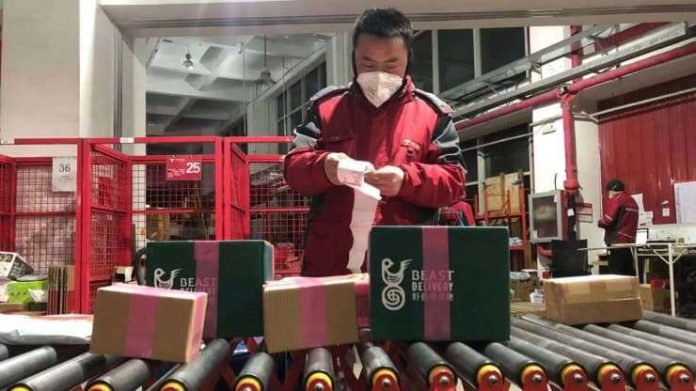BEIJING — More people are stuck at home in China as they wait out the coronavirus outbreak, giving some delivery and e-commerce companies an opportunity, even as they try to manage the risks of the disease.
Previously, on a typical day, a courier for JD.com in Beijing would deliver about 140 to 150 packages per apartment complex, said Lansong Sun, head of the company’s delivery station in Yizhuang, on the outskirts of Beijing.
Now, that’s climbed to more than 200 orders a day, Sun said Tuesday, according to a CNBC translation of his Mandarin-language remarks.
More than half of China is shut down as authorities try to limit the spread of a pneumonia-causing virus that emerged in late December. It has killed more than 500 people, primarily in the city of Wuhan, but has infected more than 20,000 people throughout the country.
In an effort to prevent the virus from spreading, at least 24 provinces, municipalities and other regions have told businesses not to resume work before Monday. Beijing city authorities have strongly encouraged companies to let employees work remotely until Monday as well. Schools across the country are also generally shut until mid-February or later.
Pick up in grocery delivery
As people stay at home and avoid public areas, they’ve turned to grocery shopping online from companies that boast of one or two-hour delivery during normal operating times. As expected, orders for face masks and disinfectants have also surged.
For example, JD’s affiliate Dada, which delivers for Walmart and local grocery chains, said sales more than quadrupled from a year ago during the 10 days of the Lunar New Year holiday that ended this past Sunday. In the same period, JD said its own sales of fresh products increased more than three times compared with last year. The company said it sold 15,000 tons of fresh products during the holiday period.
Figures from rival Alibaba’s Hema grocery store and fresh produce delivery platform were not available.
Anecdotally in Beijing, while workers make their way back to the city, the customer demand is so high that orders can take hours longer than scheduled to arrive. And rather than stretching into the evening, available delivery slots are often cut short.
Demand also remains relatively high in meal delivery. On Wednesday, a Beijing city official disclosed that about 20,000 delivery people were manning an average of more than 400,000 orders a day from takeout platforms Meituan and Elema, according to state media. The article added that delivery people are requested to wear face masks and conduct temperature tests.
Challenges from the virus
The virus has created some other logistical challenges for delivery, especially food.
Meituan, Hema and Dada have announced an in-app feature for contactless delivery, allowing the courier to leave an order in a convenient spot for the customer to pick up, without having to interact.
Kentucky Fried Chicken and Pizza Hut brands also launched a similar option for delivery. Parent company Yum China said in a statement to CNBC that the brands are testing out a feature in China for ordering online, and picking up in-store without contact. Meituan said it is trying something similar.
In many areas, couriers can no longer send packages straight to the door. Instead, they must call customers to pick up parcels from the front gate of the apartment complex, which can sometimes be a several minute walk away from the customer’s unit.
“It certainly lowers efficiency,” Ruichuang Chen, a JD.com courier, said, according to a CNBC translation of his Mandarin-language remarks. One of JD’s selling points is same-day or next day delivery.
While most people are at home and will fetch packages quickly, Chen noted that other customers may be asleep or not understand the policy and are unwilling to pick up deliveries. In order to make sure customers get their packages, Chen said he starts his day around 7 a.m. and keeps going until all the parcels are delivered.
Overall, industry representatives and analysts said logistics companies were operating fairly normally outside of areas such as Hubei, the province that has been hit hardest by the virus. Many businesses have also participated in accelerating delivery of medical supplies and other necessities to Hubei and the city of Wuhan through special channels.
But for most of the country it may take a few days or even weeks longer for orders to arrive, given the postponed re-opening of many businesses and quarantined cities. Earlier this week, some cities such as Hangzhou — where Alibaba’s headquarters is located — also stepped up inter-city highway closures and said households should only send one person out to buy goods every two days.
Alibaba’s logistics affiliate Cainiao said it “will deploy workers according to the specifics of government policy on returning to work.” That’s according to a CNBC translation of the Chinese-language text.
Virus-related disruptions, especially for China’s manufacturing hubs, will hit the entire logistics industry, Charles Guowen Wang, director at think tank China Development Institute, said, according to a CNBC translation of his Mandarin-language remarks.
Delays in returning to work will slow down the ability of manufacturers and related logistics services to get back up to normal operating speed, Wang said, adding that the efficiency of logistics relating to daily needs will also have a clear drop, likely affecting profits.
One-time boost?
It’s still unclear what the ultimate economic impact this year will be. The shutdown is essentially an extension of the Lunar New Year holiday, which began on Jan. 24 this year.
The holiday is typically an off-peak season for e-commerce since most people are traveling overseas, said Charlie Chen, director and head of the consumer team at China Renaissance. If people are at home, they will typically spend more time on their phones, and play games or shop, he said.
However, he expects these to be one-time purchases, and that after the threat of the virus dies down, many consumers will return to their habit of going to fresh produce markets.











